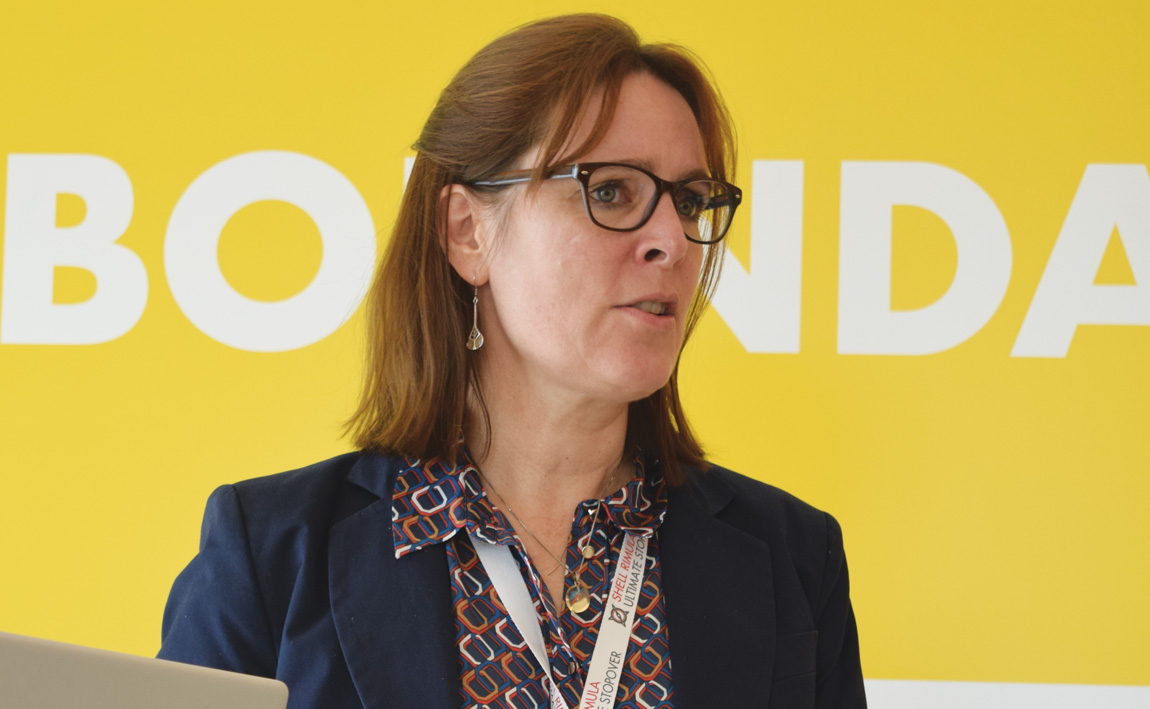Face to face with Sophie Punte

Sophie Punte, executive director of the Smart Freight Centre, has a dream. She would like to “green” the global supply chain. CHARLEEN CLARKE went face to face with her and asked her how she planned to achieve this.
Have you always been an environmental champion?
Yes, when I was 21, I travelled to India and I returned a changed person. I discovered that the environment needed to be protected and I decided to dedicate my life to this cause. I used to run a non-governmental organisation (NGO) called Clean Air Asia.
This NGO strives for better air quality and healthier, more liveable cities in Asia. It aims to reduce air pollution and greenhouse gas emissions in more than 1 000 cities in Asia through policies and programmes that cover air quality, transport, industrial emissions and energy use.
How and why did you start the Smart Freight Centre (SFC)?
Five years ago, I decided to start the SFC – because, while working at Clean Air Asia, I observed that a lot of the pollution in the cities was caused by transportation. We also discovered that only one out of ten vehicles in Asia was a truck – but that those trucks were generating more than
50 percent of the pollution.
I decided that something had to be done, so I approached the Shell Foundation in 2013 and suggested a global non-profit organisation that could address this problem. Luckily they agreed – and the SFC was born.
It’s something I’m passionate about: minimising carbon is not only a “feel good” for the planet – our collective future as a human race depends on us dealing with the threat of climate change. My first day as executive director of the SFC was August 1, 2013, and my desk was my sister’s kitchen table!
Your vision is “smart freight”, and the transformation of the industry into an efficient and environmentally sustainable, global logistics sector. That’s quite a mouthful. The challenges you’re facing are quite enormous, not so?
Yes absolutely. The real challenge we face is that demand for freight transport is predicted to triple by 2050. Considering this growth, the total emissions from freight needs to reduce by up to 80 percent by 2050, compared to 2015 levels, if we are to meet the ambitions set out in the Paris Climate Agreement, which came into force in 2016.
This is quite some challenge, considering that trucks currently use 17-million barrels of oil per day as fuel, which makes them the second-largest source of global oil demand.
How did you set about achieving change?
Well, the freight sector is a commercial sector, so we need to work through businesses to drive change. If you look at the freight sector, it is super fragmented – especially road freight and, because it is often outsourced, nobody takes ownership. So, what we did was to look for the logical owners. These are by and large the multinationals that want to get their goods shipped around the world.
Surely those companies were already focusing on “greening” the supply chain?
Not necessarily! We examined 100 multinationals with a global logistics supply chain and only 33 were reporting their outsourced logistics emissions in their annual or sustainability reports. Those that did were vague; all the companies reported their emissions very differently, so we developed a guideline on measuring emissions across all modes.
It was vital to have one
methodology, so we could compare apples with apples. Accordingly, we formed the Global Logistics Emissions Council (GLEC). In 2016, we released the GLEC Framework, which is the only globally recognised, harmonised method for calculating and reporting emissions across the multi-modal logistics supply chain.
Do you encounter resistance from any of the companies with which you work?
No, not really. Companies are motivated to optimise their supply chain efficiency, because it saves fuel and money, and improves the quality of freight delivery. The good news is that carbon emissions are mostly generated by burning fuel, and therefore minimising carbon goes hand in hand with improving efficiency.
Are companies also motivated by a fear of carbon taxes?
Yes. It is only a matter of time before governments start putting a price on carbon to get businesses to manage and reduce their climate impacts.
Going forward, you will help companies to manage this risk, correct?
Yes we will. We are dedicated to a more efficient and low-emission global freight sector that contributes to staying within Paris Agreement targets. We’re bringing together the global logistics community to drive transparency and we’re mobilising multinational companies and their logistics partners to take action.
We’re developing global industry guidelines and then we play an advocacy role to get these guidelines adopted across industry. This is important for businesses that operate across borders. We also support businesses in their efforts to calculate, report and reduce emissions through advice, assessments, training, events and recognition of what we call “Smart Freight Leaders”.
How successful has the SFC been to date?
Some 20 multinationals have adopted the GLEC Framework thus far. It is only a matter of time before using the GLEC Framework will become common industry practice.
We’ve also made lots of progress within individual companies. One company that applied the GLEC Framework found it could reduce up to 20 percent of emissions by offering alternative routes to its client. We also worked with four carriers in Beijing who after a pilot with high-quality tyres decided to use only these in the future, saving three percent in fuel, but much more money because the tyres last a lot longer.
This was the start of the Smart Truck Fleet Manager training that we gave to more than 100 fleet managers in China, Ireland and South Africa. There are many other similar success stories.
Published by
Charleen Clarke
focusmagsa



